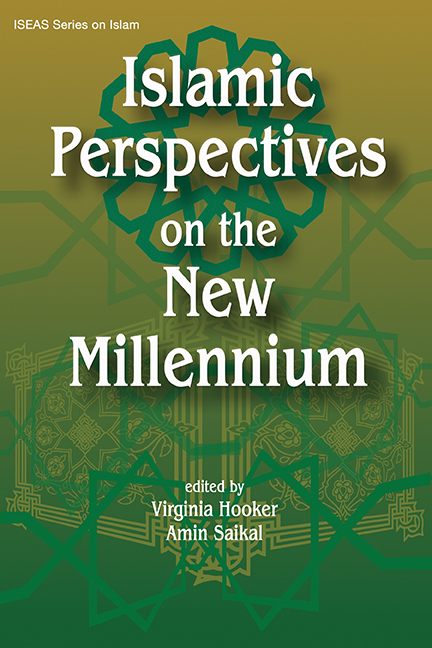Book contents
- Frontmatter
- Contents
- Acknowledgements
- Contributors
- 1 Islamic Perspectives on the New Millennium
- The New World Order
- 2 Islam and the West: Challenges and Opportunities
- 3 Indonesian Responses
- The New Age
- The Economy
- The Nation-State
- Muslim Women
- Law and Knowledge
- Conclusion
- Glossary
- Index of Names
- Index of Subjects
3 - Indonesian Responses
from The New World Order
Published online by Cambridge University Press: 21 October 2015
- Frontmatter
- Contents
- Acknowledgements
- Contributors
- 1 Islamic Perspectives on the New Millennium
- The New World Order
- 2 Islam and the West: Challenges and Opportunities
- 3 Indonesian Responses
- The New Age
- The Economy
- The Nation-State
- Muslim Women
- Law and Knowledge
- Conclusion
- Glossary
- Index of Names
- Index of Subjects
Summary
This chapter describes Indonesian Muslim responses to, and perspectives of, “the new world order”, and shows how they are shaped by a set of historical, economic, and political conditions, including the recent reformasi (reform) movement. The perspectives and responses are not necessarily consistent over time or substantially monolithic. All Muslims do not share them. In addition, Muslim perspectives of the new world order are closely related to perceptions of roles and positions within the domestic, national order.
At the outset, it should be stated that the “Islamic factor” has historically been of secondary importance to the foreign policy of Indonesia. This was especially true during the Soeharto era. Many groups and leaders within the Muslim community in Indonesia, however, have been very much concerned about problems and issues in the Islamic world, such as the Israeli-Palestinian conflict, the Gulf War, the conflict in Bosnia, and the problems of various Muslim minorities. They have argued that as the world's largest Muslim nation, Indonesia should have a more activist foreign policy towards the Islamic world. For instance, Amien Rais, former chairman of Muhammadiyah and now the Speaker of People's Consultative Assembly, has argued that Indonesia should identify itself more with the Islamic world than with the Far Eastern nations. In 1987, the Indonesian Committee for the Islamic World's Solidarity (KISDI) was established to foster ties between Indonesian Muslims and the larger Islamic world.
When Abdurrahman Wahid, the former chairman of Nahdlatul Ulama, ascended to the Indonesian presidency, there was an expectation among Muslims that his rule would be a turning point in the history of Islamic political representation in Indonesia, including in the diplomacy and foreign policy sectors. His choice of Alwi Shihab, a scholar in Islamic studies, as the Minister of Foreign Affairs further strengthened this expectation. However, to the disappointment of many Muslims, President Wahid did not address the above concerns. On the contrary, in the first weeks of his rule, he created a widespread controversy among Indonesian Muslims, including Nahdlatul Ulama, when he publicly endorsed the possibility of opening trade and diplomatic relations with Israel. In the first month of his presidency, rallies were held in many cities to protest against this proposal. The protesters accused Wahid of being “the mouthpiece of Zionism, begging Jewish money”.
- Type
- Chapter
- Information
- Islamic Perspectives on the New Millennium , pp. 32 - 40Publisher: ISEAS–Yusof Ishak InstitutePrint publication year: 2004

